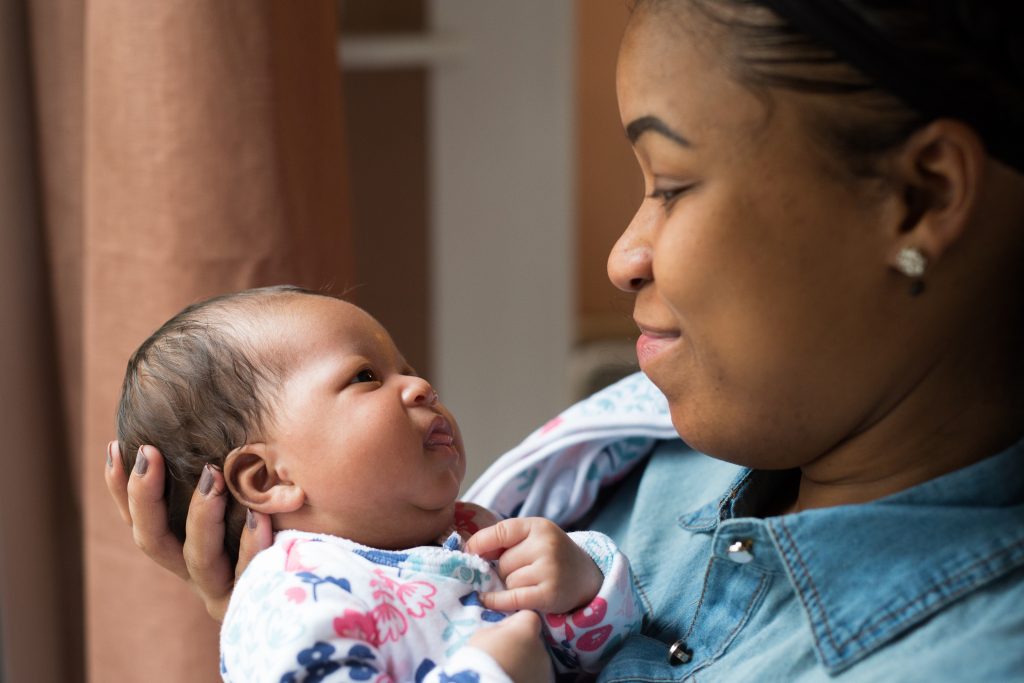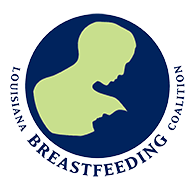Support Breastfeeding in Child Care Settings
Project Background
In collaboration with Our Lady of the Lake Children’s Hospital, local breastfeeding coalitions, and Volunteers of America/Partnerships in Child Care, the LBC has developed the Supporting Breastfeeding in Child Care Settings Toolkit to encourage and improve support for breastfeeding in Louisiana child care settings. This toolkit is designed for Child Care Health Consultants (CCHCs) and others such as physicians, lactation consultants, and dietitians to educate child care providers on best practices for supporting breastfeeding families, handling breast milk, and accommodating employees that are breastfeeding.

Presenter/Trainer Materials
- Presenter’s Instructions – IMPORTANT: READ THIS FIRST!
- Power Point Presentation and Speaker’s Notes: Supporting Breastfeeding in Child Care Centers – For this presentation, please email workplacebreastfeeding@gmail.com, and we can send it to you
- Supporting Breastfeeding Project Logos Jan 2014
- Pre and Post Test with Answer Key
- Non-CCHC Certificate of Completion*
- Non-CCHC Evaluation Form*
- Non-CCHC Participant Sign-in Sheet*
- Documents to be completed with the center director:
*Note: Louisiana DHH-approved Child Care Health Consultants should use the program’s certificates, evaluation forms, and sign-in sheets.
- Pre and Post Test
- Our Center Supports Breastfeeding
- Breastfeeding and Child Care-What Moms Can Do
- What Child Care Centers Can Do
- Storage and Handling-Guidelines for Providers
- Sample Center Breastfeeding Policy (Sample Child Care Center BF Policy-Editable Version)
- Breast Milk Errors (Mix-ups)-Guidelines for Providers
- Sample Center Infant Feeding Plan (Sample Center Infant Feeding Plan Editable Version)
- Paced Bottle Feeding Handout
- Tips for the Day Care Provider of a Breastfeeding Baby (Other free breastfeeding related handouts for parents can be found at Lactation Education Resources)
To get sent a zip file of all the participant handouts together, please email workplacebreastfeeding@gmail.com.
1. How long can I leave a bottle of breastmilk out before throwing it out?
- According to breastfeeding experts, a bottle of freshly expressed breast milk is good for 6-8 hours if kept at room temperature. Once the milk has been given to the baby for a feeding, however, it should be discarded after that feeding and not used for the next feeding. Moms should store breast milk in small increments so that milk is not wasted.
2. Are children over 1 year able to continue to have breast milk or are they required to switch to cow’s milk?
- According to the American Academy of Pediatrics, breastfeeding can continue for as long as the child and mother want. Child care providers can support breastfeeding after the age of 1 by continuing to provide expressed breast milk with meals in addition to age-appropriate solid foods. This is considered a reimbursable meal according to the Child and Adult Care Food Program (CACFP).
3. Should gloves be worn to prepare breast milk?
- The Caring for Our Children Manual, OSHA policy, and other national experts agree that breast milk is not a “hazardous substance,” and protective gloves are not required to handle it. The Louisiana Department of Health does not require that gloves be used when taking care of breastfed babies in the child care setting. Some child care providers choose to use gloves, but it is not required.
4. When should solids be started for infants?
- The Child and Adult Care Food Program states that infants over 6 months may receive appropriate solid foods. Due to recent research, delaying the introduction of allergenic foods (such as nuts, milk, eggs, and seafood) has fallen out of favor, and the CACFP now allows them as part of reimbursable meals. Any food which is a choking hazard should be restricted, and honey should not be introduced until after 1 year due to the risk of botulism.
5. What should I tell a parent who asks that their infant be fed a certain amount of milk every 3 hours (or some fixed schedule)?
- It is important that babies and children learn to listen to their own signals when it comes to feeding, starting from birth. If children learn to eat when hungry and stop when full, they are less likely to become overweight later in life. Every infant is different; some may want several ounces every 4 hours while others are happier (and spit up less) if they eat 1-2 ounces every 2 hours. Also, a child’s eating pattern may change from day-to-day according to unpredictable growing spurts. Fixed schedules are convenient for caregivers, but they are not right for every baby.
6. Where can I find local breastfeeding resources to give to the parents at my center?
- LABreastfeedingSupport.org is an online resource guide for breastfeeding support in Louisiana; search for resources in a specific area by entering a zip code.
7. Where can I get culturally appropriate breastfeeding literature, books, or posters?
- For a list of children’s books that portray breastfeeding as the norm, go to: https://lllusa.org/lets-celebrate-national-breastfeeding-month-with-childrens-books/
- For great breastfeeding handouts and literature, go to Womenshealth.gov section on breastfeeding: BF: https://www.womenshealth.gov/breastfeeding
To download a PDF version of the frequently asked questions and answers, click here.
This project and toolkit have been adapted from the “Breastfeeding-Friendly Child Care Initiative” of the Carolina Global Breastfeeding Institute /UNC Gillings School of Public Health and the Wisconsin Department of Health Services, Ten Steps to Breastfeeding-Friendly Child Care Centers Resource Kit. Additionally, this project has been supported by grants from the Our Lady of the Lake Children’s Hospital Foundation, the American Academy of Pediatrics, and the Healthy People 2020 initiative.
Have You Experienced Discrimination From a Childcare Provider?
Please email breastfeeding@la.gov and louisianabreastfeeding@gmail.com and tell us about your experience. This helps us to document discrimination/violations internally. If it is wanted, we are also happy to support moms in taking action, such as reaching out to the childcare center and teaching them how best to support breastfeeding families.
